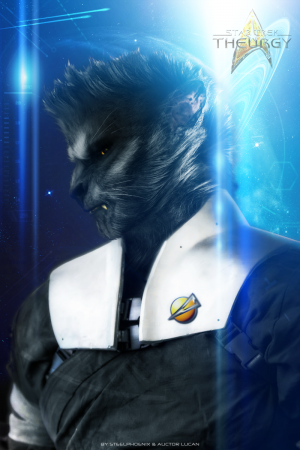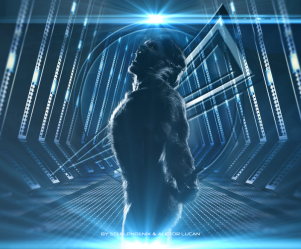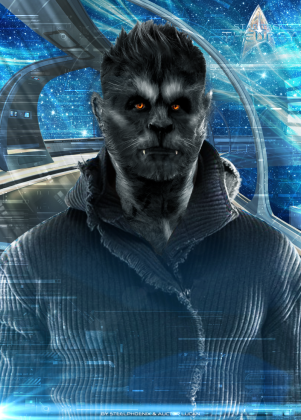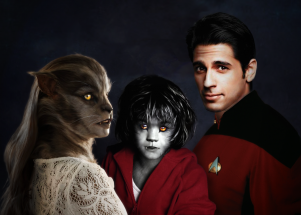Deacon (KIA)
From Star Trek: Theurgy Wiki
 | |||
| |||
|---|---|---|---|
| Name: | Deacon (Kzinti name) Xander Maryk (legally, per Federation records) | ||
| Rank: | Civilian | ||
| Position: | Defector | ||
| Species: | Half-kzin, half-human; genetically and medically modified to resemble pure blooded kzin within 97% accuracy | ||
| Age: | 20 | ||
| Gender: | Male | ||
| Orientation: | Heterosexual | ||
| Birthplace: | London, England, Earth | ||
| Height: | 6'8" | ||
| Weight: | 342 lbs | ||
| Hair: | Black and charcoal fur | ||
| Eye color: | Gold | ||
| Played by: | Tim Gabel | ||
| Interests | |||
| Self-improvement Eugenics humanitarian Efforts | |||
| Education | |||
| 2368 - 2374 Apprenticeship with the Black Priests | |||
| Service Record | |||
| 2374 - 2381 Served as an initiate of the Black Priests of the Fanged God | |||
| Decorations | |||
| No decorations or distinctions; in Kzinti society, performing particularly glorious deeds would earn the kzin a unique name. | |||
Deacon was an Kzinti defector who was held in custody on Starbase 84 in March of 2381. Deacon then ended up aboard the USS Theurgy at the end of the Battle of Starbase 84 after escaping from protective custody. Deacon ended up aiding in the opposition against the parasites that compromised Starfleet Command in the end of the 24th century.
Biography
In 2360, a Starfleet officer named Lt. Logan Maryk discovered a downed Kzinti vessel with a single survivor on board -- a kzinrett, whom he later named Hssera, who was on the verge of death from starvation. She bonded instantly to her rescuer, sticking closely to his side even as he returned to Starfleet duties. Many attempts were made to return her to the Kzinti homeworld only for her to refuse time and again and for the Patriarchy of the Kzinti to take no particular interest in the return of a single, subsapient female.
Unable to simply free her into Federation space, Lt. Maryk opted to care for her himself and, in time, came to love her. In the year 2361, she bore him a son whom he named Xander. The kzinrett struggled with the name, settling instead on the shortened version "Xan". The family had temporarily settled on Earth to seek the necessary medical aid for such a difficult pregnancy, but with their son hale and healthy, it was necessary for Lt. Maryk to again resume his Starfleet career, his growing family in tow.
Despite the difficulties, Hssera cared dutifully for Xander, even among the alien environs of their starship home. This would come to a catastrophic end, however, in 2367 with the Borg assault at Wolf 359. In the heart of the assault, a portion of the bulkhead collapsed, killing the kzinrett. Confused and traumatized, six year old Xander wandered into the hall outside his quarters as the evacuation order was given. One of the evacuating crew members found Xander and carried him to the escape pod intending to reunite him with his parents once they were safely away from the battle. Sadly, Lt. Maryk was among the crew lost when the bridge suffered a catastrophic environmental breach. In a matter of minutes, Xan was an orphan.
Back on Earth, it was determined that, since Lt. Maryk had no other family, Xander would be sent to the Kzinti to be raised by Hssera's father, a member of the Black Priests. The cultural shock for the child was unbearable. As a half-human, he was ostracized and shunned. As the son of a human father, he had no name among the Kzinti. His grandfather, while accepting of his burden, kept the boy at arm's length until broken and desperate, Xan begged to be more like his grandfather just so he'd love him. He knew very little of the Kzinti, but he'd cherished his mother who had doted on him constantly, unaware that the Patriarchy was far less kind.
At his grandfather's direction, Xander was subjected to a long series of painful genetic and reconstructive treatments intended to "burn away" the human taint within him. In time, the grandfather consented to speaking to naming Xander by way of his lineage, as was tradition, and the boy received some semblance of acceptance at last.
In 2374, in the midst of the Dominion War, Xander was finally presented before the Black Priests to mark his rite of passage into maturity when he would eligible to earn a name of his own instead of being known by relation to his lineage. Seven years had passed since he'd come to live among the Kzinti and his life as Xander Maryk was little more than a hazy after thought. For his dedication to the Fanged God and his willingness to purify himself before the Patriarchy, he was given the Kzinti name and position of Deacon, until through his own deeds and glory, he could earn a name unique to himself.
Following the Treaty of Bajor in 2375, the Patriarchy saw the Federation in a position of weakness not seen since the time of the Human-Kzinti Wars some 300 years prior. The Patriarchy had long resented their losses and the short chain that the Federation had kept on them in that time, and with the mounting instability in the Romulan and Klingon Empires and the struggles of the Cardassians to rebuild in the wake of the Dominion invasion, the time to strike and restore the glory of the Kzinti was now.
The initial assaults were on isolated, outlying colonies, be they Federation, or any of the other nearby powers; the Patriarchy did not discriminate against its targets, opting to slaughter any who stood in their way, and seize any technology and weaponry as spoils for the coming war that they would use to light the way to the new Kzinti Dynasty. The Black Priests sent representatives to inspect the results of each siege. Xander, now Deacon, saw the ghastly results of his people's disdain for the other races and try as he had to expunge any lingering shred of humanity, the horrors of this new campaign troubled him deeply.
Deacon saw six years of savagery against several outposts, guilty solely of lying within the targets of the ever growing Kzinti war machine. Throughout the years, he had done what he could to secretly help the hidden survivors he might encounter in his inspections, all the while doing his utmost to maintain the facade of his loyalty to the Patriarchy, but by 2381, such small acts of defiance no longer settled his growing unease. He found himself racked with disturbing dreams, half-remembered fragments of the assault on Wolf 359 and he grew ever more discontent and isolated. Fearing that such thoughts would soon betray him to his superiors, Deacon commandeered a vessel during a mission near the Romulan/Federation border and sought his escape by surrendering himself to custody at Starbase 84.
Hoping his confessions and intelligence into the Patriarchy's plans would incentivize the mobilization of Starfleet to take action, Deacon was disappointed to find his revelations fell on increasingly dispassionate and uncaring ears. This was not the Federation into which he'd been born. Something new and dark had taken hold and seemed to welcome the discord of the Kzinti raids like an addict to the needle.
While it took some time to confirm his birth identity, the slight imperfection in his genetic reconditioning ensured that careful scrutiny would reveal his Federation citizenship and, as such, he has remained under protective custody on the starbase since his defection.
Family members:
- Lt. Logan Maryk (father, deceased)
- Hssera (mother, deceased)
- Hroth-Priest (maternal grandfather)
Personality Profile
Deacon was full of conflicts and regrets. While he struggled to maintain a facade of self-assurance, sufficiency and strength, he was often plagued by bouts of loneliness, isolation and self-doubt. He lost both of his parents at a young age only to be raised by a grandfather who was emotionally distant until Deacon abandoned all that he was in order to seek the elder's approval. Thereafter, he was raised in a highly misogynistic society with deeply ingrained cultural suspicions and prejudices and though he did his utmost to overlook them, he constantly struggled between perpetuating and overcompensating for those beliefs.
He considered himself a half-humanitarian -- a small joke since he was only half human and could think of no Kzinti equivalent to humanitarianism. While all Kzinti males were expected to be strong warriors, as an initiate of the Black Priests, Deacon was taught to be a thinker foremost, working from behind the scenes to shape the Patriarchy and his people as a whole. He strove to see the big picture, but his innate compassion sometimes forced him to act in the now rather than focus on the grander scheme of events.
Although he loved the taste of berries and citrus as a child, after his transformation, he found himself unable to digest plants and was forced to subsist solely on a carnivore's diet as other Kzinti.
Deacon suffered from undiagnosed chronic post traumatic stress disorder resulting from witnessing the death of his mother during the Battle at Wolf 359. The disorder was suppressed while he lived among the kzinti as he rarely experienced anything that would trigger his condition and, in time, he buried the conscious memory of the event. After arriving in Federation controlled space, however, where he was exposed to environments and experiences similar to those he knew as a child, the attacks became more frequent and extreme and he was unable to cope with them on his own, forcing him to spend much of his time in proximity to Below Decks as the environment was sufficiently dissimilar to locations he'd visited as a child.
Physical Profile
Tall and powerfully built with a long feline tail and digitigrade legs; he was covered in short black and charcoal fur all over his body with longer tufts from the top of his head, trailing down along the upper spine to form a scruff.
Reduced Pain Perception
Because of the extensive medical treatments he agreed to undergo as a child in order to better fit into Kzinti society, Deacon had a remarkably high tolerance for pain. Physically speaking, due to a combination of damage to his dermal nerve network and over-stimulation of the thalamus resulting from extensive surgical pain in his youth, Deacon's protopathic neuron sensitivity was somewhat reduced causing him to have a perception of pain roughly 50-60% of normal. He relied on deep tissue stimulation from nerve endings connected to his fur and whiskers to compensate for any other deficits in sensation. It was believed that, thanks in part to his training and force of will that Deacon could, under ideal circumstances, effectively short out his perception of pain altogether, but this came at the risk of suffering severe damage such as the breaking of bones, tearing of muscles, or even bleeding out if he exceeded his physical capacity or became wounded without noticing.
Heightened Strength
Like all kzinti, Deacon was significantly stronger than a human, however given his size and religious training, he was not as powerful as a full blooded kzinti warrior trained to that end. On average, Deacon demonstrated strength roughly 4 to 5 times that of an average human male, allowing him to bench press up to 400kg (~900lbs), deadlift or squat 450kg (~1000lbs) and one-arm curl just over 150kg (~350lbs).
Empathic Abilities
Curiously, while all kzinti possessed a latent sense known as ziirgah that allowed them to instinctively sense the emotions of other around them, societal taboos forbade the intentional and willful use of this ability to 'read' others as it was the root of the telepathic abilities that would occasionally arise in some male members of the species. Kzinti males possessing black fur, however, were incapable of telepathy as the two genes were considered mutually exclusive. Deacon, however, was of mixed blood, with his fur color being determined, in truth, by the color of his human father's hair, and although this did not result in true telepathy, his empathic abilities were significantly more advanced than normal for that standard kzinti. The strength of his empathy was strictly based on range, with those in close proximity potentially even affecting his own emotional state.
Although he received no formal training in the use of his ziirgah, his had received training in telepathic countermeasures in order to resist mental intrusions from rogue telepaths. These defensive measures became second nature to him causing them to be in effect unless he was mentally exhausted, and took the form of, first, a field of psychic white-noise and a deeper, more labyrinthine layer of thought misdirection and false imagery.



